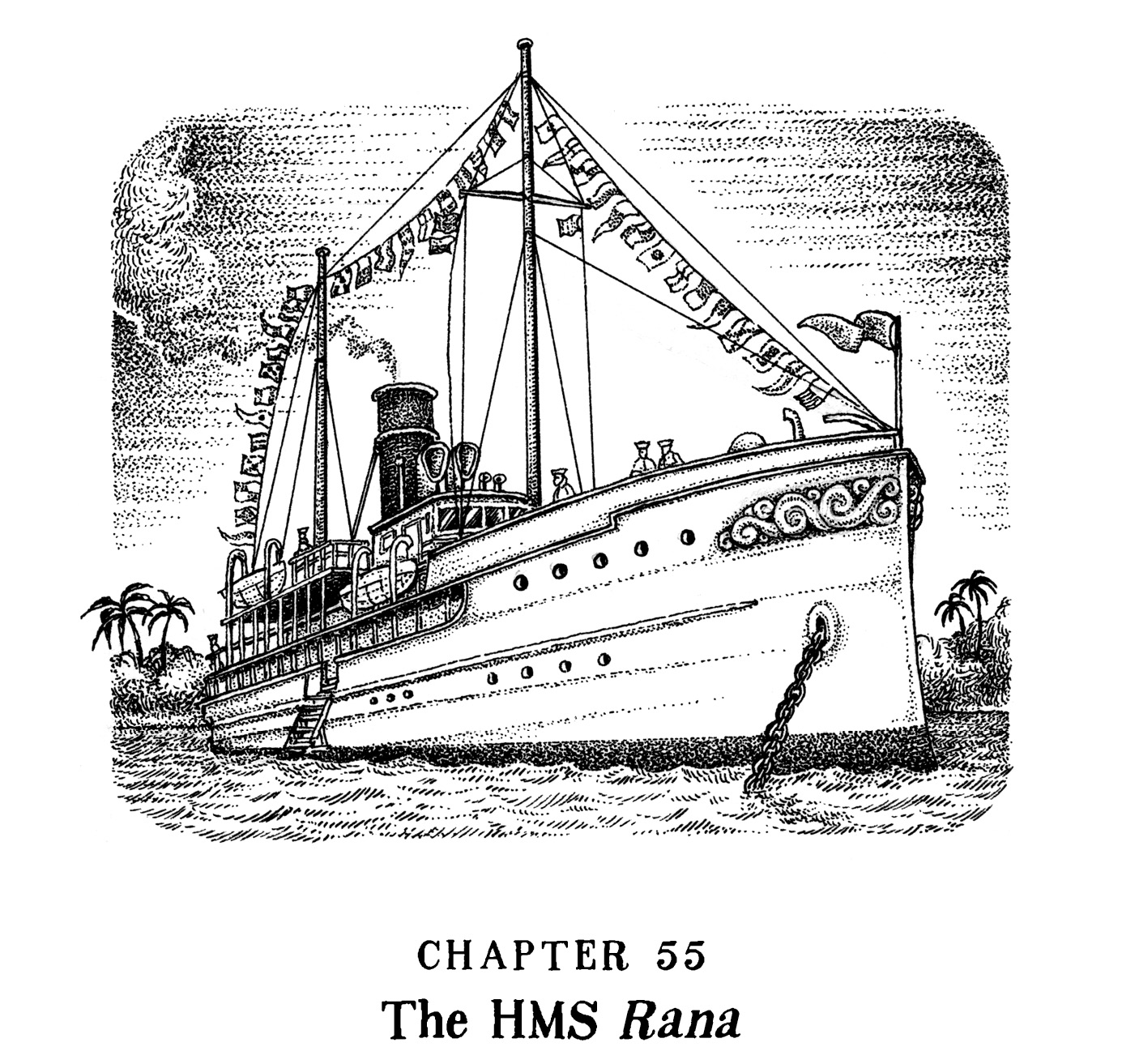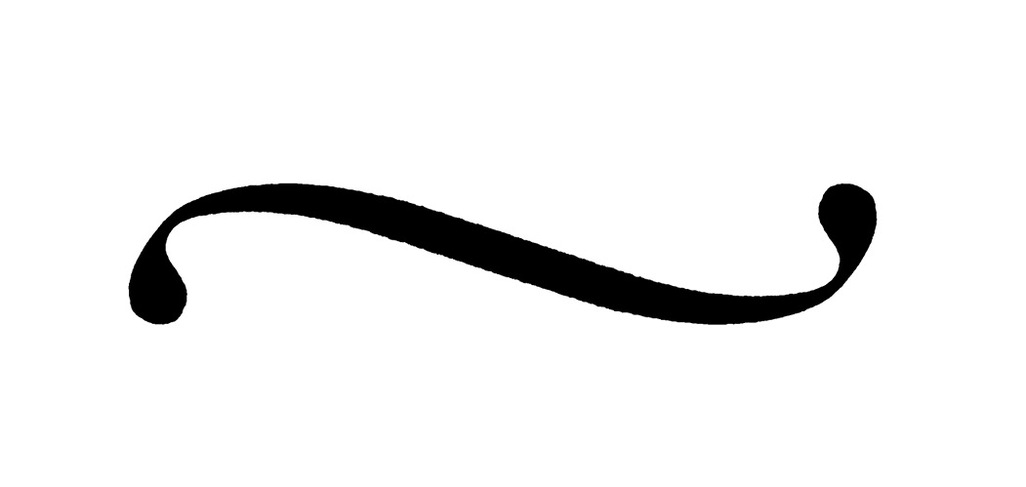

It was a beautifully clear morning when we boarded the maharaja’s private train, and five days later we arrived in Bombay. We were then driven in a cortege of cars to the Royal Bombay Yacht Club; from there a steam launch took us out to the HMS Rana, the maharaja’s yacht, which was at anchor in the roads.
The HMS Rana was a very fine vessel, well designed and well constructed down to the smallest detail. The fittings were as costly as anything in the maharaja’s palace. Only twenty of the eighty-strong crew were sailors, the rest being there simply to serve the passengers.
I had estimated that we would reach Cochin in four days at the most, but I soon realized the voyage was going to last considerably longer. The maharaja was in no hurry. He wanted to be able to sit under a parasol on the sundeck and drink champagne with Ana without being disturbed by unpleasant headwinds, which meant that we proceeded south along the coast of Malabar at the slowest speed possible. Most of the time we sailed near enough to the coast for the beaches of white sand and the coconut palms swaying in the gentle southwesterly breeze to be visible through binoculars. Every afternoon we dropped anchor for the night to allow the maharaja to take Ana ashore for romantic excursions in the sunset.
I tried to be patient. After all, we were on our way even if we were moving so slowly. But I did find it strange to be at sea and not have anything useful to do. My only meetings with Ana were when the maharaja summoned me, which happened no more than a couple of times during the voyage. Once we had come aboard the HMS Rana he no longer needed me either to spy on Maji Sahiba or to look after his airplane. Added to which he obviously wanted Ana all to himself.

We eventually arrived off Cochin late one afternoon when the sun was glowing red on the western horizon. Cochin is situated on a peninsula between the Indian Ocean and Vembanad Lake, a great lagoon of brackish water in which ships are protected from wind and waves. An ancient gunboat guided us in through the sandbanks round the approach to the port, and a seventeen-gun salute was fired from the walls of the fortress. A small crowd had gathered along the wharves that lined the shore, and they were waving their hats and flags to welcome us.
When the HMS Rana had dropped anchor I was summoned to one of the maharaja’s many private rooms. It was Ana who had sent for me. The maharaja had given her permission to meet me for a short time before dinner.
Ana looked tired, and she seemed rather annoyed.
“I can’t stand much more of this luxury life,” she whispered. “The maharaja is immensely thoughtful and generous, but it’s becoming too much. And I get headaches from all the champagne. I don’t think he drinks anything else!”
I nodded. I knew what she meant.
“I’ve tried several times to talk to him about Alphonse Morro,” she went on, “asked him how we should go about finding him, but I haven’t had a proper answer. He seems completely uninterested. The only thing he wants to talk about is how enjoyable it will be to go duck shooting with the Maharaja of Cochin.”
I learned that Ana and the maharaja were leaving the following morning to make a state visit to the Maharaja of Cochin. They would be spending several days at his palace, the Hill Palace, about eight miles inland. I was to remain on board the Rana.
Ana could see I was disappointed, and she took my hands in hers.
“Don’t worry,” she said. “I’ll fix this somehow or other. We won’t leave Cochin until we are certain whether Morro is here. I promise you.”

Their visit to the Maharaja of Cochin lasted five days. Ana told me later that what had pleased our maharaja most was that the Hill Palace was so much smaller than Sunahiri Bagh Palace.
“Even my yacht is more luxurious than his palace!” the maharaja had gloated to Ana many times.
More celebrations awaited them when they returned to the Rana. There were dinner parties, afternoon teas and garden parties with the British consul and other important dignitaries in Cochin. For every invitation the maharaja received onshore, he organized something twice as grand on the Rana. On the few occasions I saw Ana she was looking pale and exhausted.
As for me, restlessness was driving me crazy. Day after day found me doing nothing but wandering back and forth along the deck of the Rana. Every now and again I would stop and peer out over the muddy waters of Vembanad Lake. Skiffs and barges and small tugs plied between the vessels anchored in the roadstead. Beyond them, no more than a nautical mile away, lay the city of Cochin. All I could see of it were the warehouses along the water’s edge and a church tower that rose above the tops of the palm trees.
My thoughts often flew across the water with the gulls and, hovering low over the city, I would catch sight of Alphonse Morro. Sometimes I would see him sitting drinking coffee at a street café; sometimes he would be carrying sacks in the harbor. On one occasion I looked through a window and saw him lying in bed with a bottle in his hand. Another time he was standing on the quayside with a suitcase, all ready to depart.
My fantasies made me even more impatient; they made my fur prickle and itch.
I was so close now.

On our eighth day at anchor a larger ship pulled alongside the Rana and a woman came aboard. She was Indian and dressed in a simple sari. She handed a letter to the officer on watch, and when he had read it the woman was brought to me. She bowed with her hands together in front of her in the Indian manner.
“My name is Ayesha Narayanan,” she said in a soft voice. “I am secretary to Diwan Al-Faroud, the Maharaja of Cochin’s prime minister. Miss Molina has talked to the diwan about you. She says you are a very unusual gorilla and you can understand what people say to you.”
I nodded and bowed in the same way as she had. The woman called Ayesha smiled. She had a nice smile, and behind her small steel-rimmed glasses her eyes were wise. For some reason it was quite impossible to guess her age.
“Miss Molina has also told us why you and she have come to Cochin. You are looking for a man called Alphonse Morro who came here from Lisbon. The diwan has instructed me to help you.”
At last! I thought. Bravo, Ana!
I have known for a long time that human beings have no idea how to interpret the noises made by a gorilla, which is why I always try to remain silent. That way there can be no misunderstanding. But now I was so excited that I couldn’t help making some happy gorilla sounds. They did not seem to worry Ayesha. She said, “I shall do my best to find this Morro man. There is, of course, a problem. Miss Molina said that Morro is on the run, so it is quite possible that he isn’t using his real name. That might make it harder to find him. But if I understood rightly, you have met Alphonse Morro and know what he looks like.”
I nodded vigorously.
“In that case it would be useful if you come with me,” Ayesha said. “The two of us can make inquiries together. If you are ready we can set off for Cochin straightaway.”